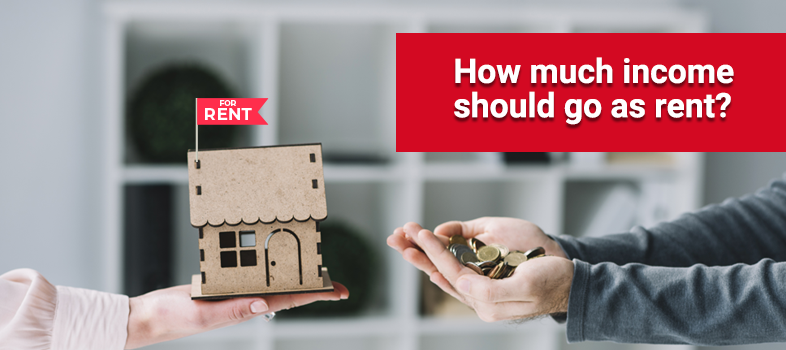Whatever one can afford depends completely on his/her income and another share of expenses, like education loan instalments, groceries, basic clothing, etc. There are different logics you can apply to set up how the rent will be deducted from your salary & help provide apportionment of the remaining. Let’s have a look as given under:
1. The 30% rule
Precisely, this popular rule of thumb is about spending 30% of your gross income on rent. Let’s say if you’ve earned Rs.10,00,000 annually, then you can keep Rs.3,00,000 for paying the rentals. This is considered to be a concrete theory, however, it’s still not a one-size-fits-all solution at all.
Also keep in mind that if you live in an affordable location, you must not give up on an apartment simply because of its lesser than 30% of your salary. On the other hand, rigidly sticking to 30% kept as rentals are not plausible in places where the house rents are naturally high, even for a smaller size.
2. The 50/30/20 rule
You can easily use the 50/30/20 logic to guide you towards the amount you can easily afford to spend on your rentals. This system will help you allocate 50% of your monthly income as needs, 30% for wants and 20% exceptionally for savings and debt payouts.
So if you earn Rs,10,00,000, then you could probably spend it in the following order:
Rs.5,00,000 meeting needs like rent, utility bills, grocery, insurance and minimum repayments
Rs.3,00,000 on wants like shopping, recreational & leisure activities
Rs.2,00,000 gets saved for future emergencies and debt payments
Start by figuring out what can you probably afford. It’s significant to factor in other costs & expenses also.
Where you live affects everything from your commute to your workout routine. Factor in additional costs (or savings) you might incur depending on your rental choice.
The location of your residence usually plays a significant part to determine costs of transportation, social engagement hubs, affordable food joints, etc. Everything adds up to your monthly house rental & should be ignored. Some other costs are of basic utilities like a gym registration, a monthly dry cleaner, etc. It’s good to include all these perks as a part of the cost of rentals.
3. Look for savings
If the rentals you can afford doesn’t match the area that you’re hunting for residential purposes, then you should look to cut costs otherwise. It’s possible to tick off the nonessential spending from your budget & make space for necessary expenses.
Utilities: Along with landline, water and electricity needs, your cable connection equally falls into the “wants” category. There’s a good choice of shaving off an expensive connection & leaning on cheap to access local channels.
Insurance: Start activity to compare different car insurance rates & find the best deal possible.
Groceries: Plan your groceries on a weekly basis & make use of coupon codes/promos to cut down on your grocery budget.
Rent: If you’re still a bachelor choose to live in a group house as it proportionally divides your rental & utility burden. Or simply find a flatmate and split the cost of the house.
You should only focus your energies to save as much as you can, instead of putting it to rentals completely. This will be a huge step towards building your emergency fund and retirement savings on top priority.

